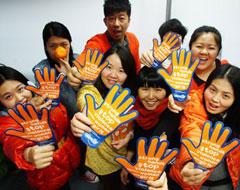UNiTE to end violence against women

People around the world spread awareness by wearing orange. Photo courtesy of www.un.org.
November 25, 2013
The Secretary General’s UNiTE to end violence against women campaign decreed the 25th day of each month as Orange Day. This day encourages people around the world to wear something orange – a shirt, socks, or even a hairclip – to emphasize its calls for the elimination of violence against women.
Historically, Nov. 25 is the date that the Dominican dictator Rafael Trujillo ordered the brutal assassination of three Mirabal sisters, political activists in the Dominican Republic, in 1960. Later, in 1981 activists marked this date as a day to campaign and raise awareness in the public of the dire situation around the world of violence against women. It is only in 1999 that this date received its official United Nations (UN) resolution.
“A lot of people think that systematized violence against women is only an issue in undeveloped countries, but they fail to realize that our own institutionalized victim blaming and rape culture has the same consequences,” junior Zoe Wang said. “This tradition of violence has to end. But people need to acknowledge this issue exists. We as a society cannot fight something that we don’t even know exists.”
The basis of this day is to raise awareness of the fact that women, not only in third world countries, but around the world, are subjected to rape, domestic violence, and other forms of abuse and mistreatment. Additionally, another aim of this day is to showcase how this issue is often hidden in news or other forms of media, unlike other acts of violence.
“It makes me so mad to hear about oppression of any kind,” sophomore Cheryl Mensah said. “I’ve been in a lot of Model United Nations conferences discussing how to eradicate or at least mitigate violence against women, and a big part of the solution is awareness, which is why I’m glad days like this exist. If people don’t even know about the problem, how can we expect anything to change?”
Violence against women is a major human rights violation and is an outcome of discrimination against women and of enduring inequities between men and women. This violence impedes and impacts progress in many areas with issues such as poverty, HIV and AIDS, and peace and security. Even though this violence is easily preventable, it continues to be a global pandemic in which seventy percent of women experience violence in their lifetime.
“It’s extremely important to spread information about violence against women because of its prevalence,” junior Carolina Hatanpää said. “If people grow up in a culture where violence against women is viewed as acceptable in any way, it creates a vicious cycle and nothing changes, but when people understand the issue, it’s easier to garner support for a movement against it.”
This year, the official theme framed by the United Nation’s Secretary General’s campaign is Orange the World in 16 Days. These sixteen days lead up to Human Rights Day on Dec. 10.





